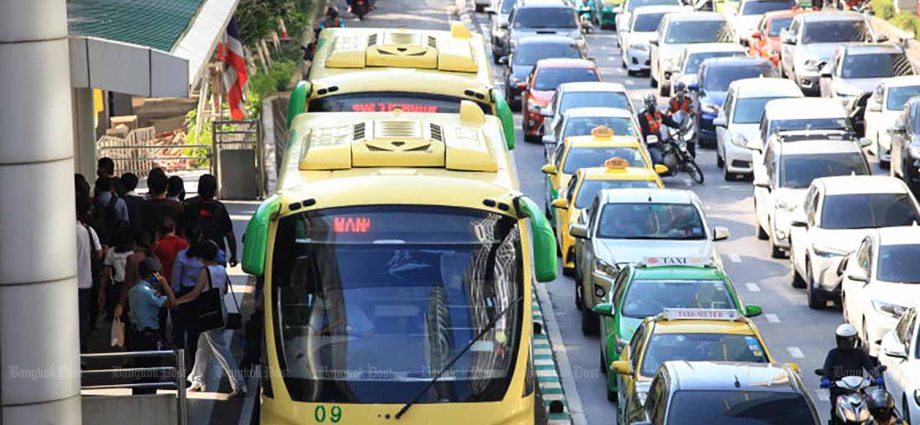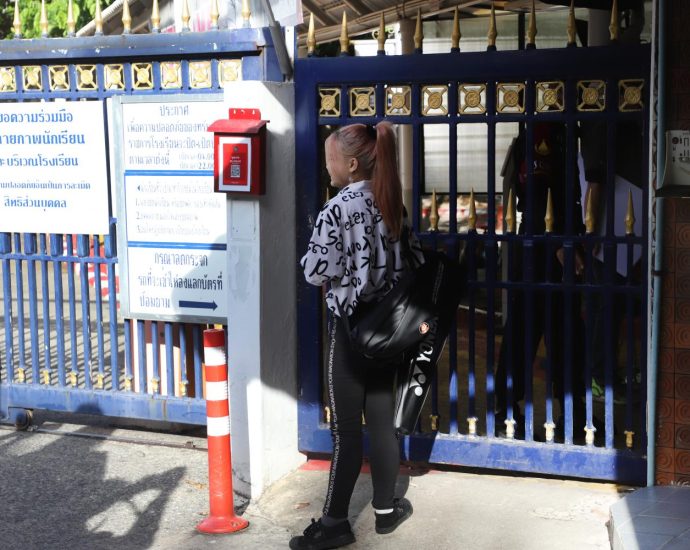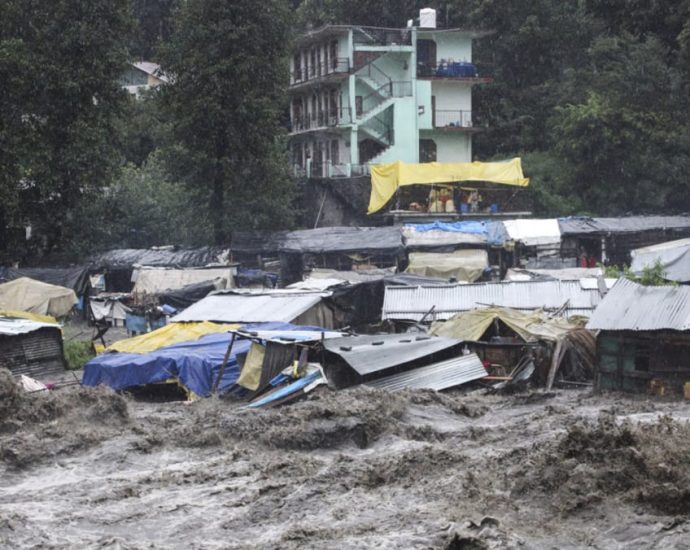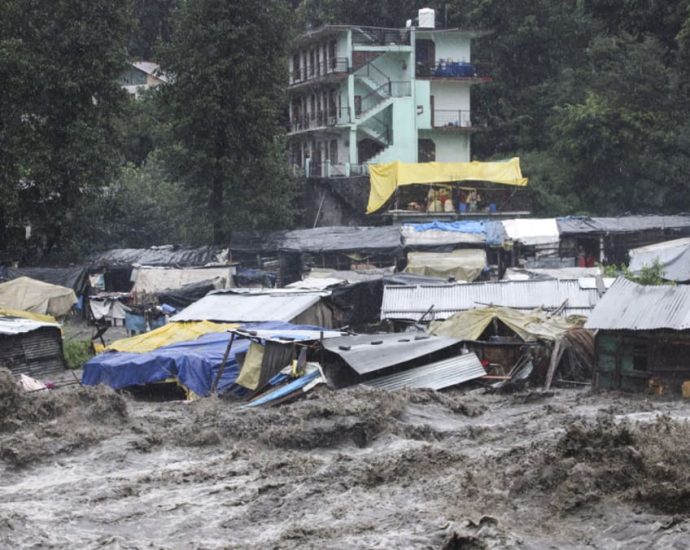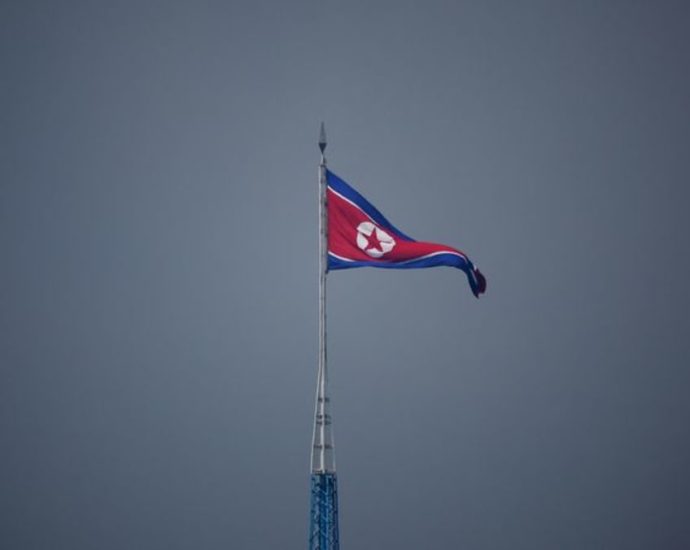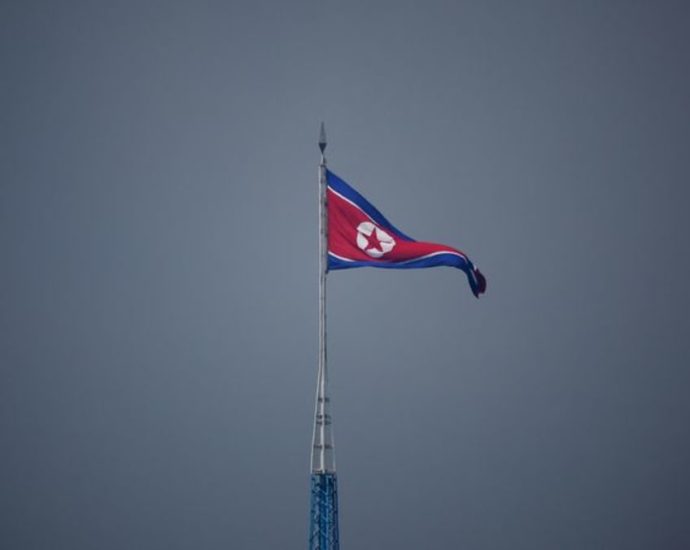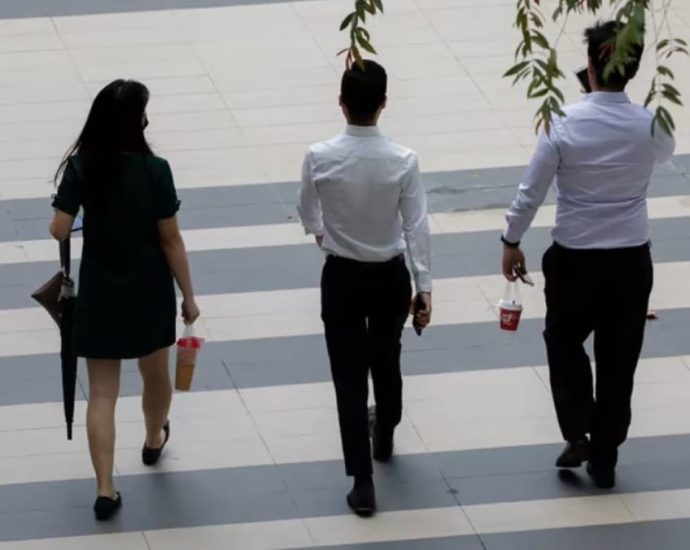City Hall will prop up Bus Rapid Transit

The Bangkok Metropolitan Administration (BMA) will continue the city’s Bus Rapid Transit (BRT) service when the concession granted to Bangkok Mass Transit System Plc (BTSC), a private operator of the service, ends on Aug 31.
BMA has a plan to improve the service, according to Bangkok Governor Chadchart Sittipunt. He told Isara News Agency the BMA plans to increase the number of BRT bus stops and the number of buses to improve convenience for passengers.
Currently, only 10 out of all 25 BRT busses are functioning which is why passengers have to wait for at least 15 minutes to board at present, he said.
In addition, many private cars drive in lanes reserved for the BRT service, especially during rush hour on Rama III Road, leading to delays in the BRT service.
He said BMA plans to increase the frequency of the service and will add more BRT stops near pedestrian crossings, which has proved effective in improving convenience for feeder-service passengers in South Korea. The BMA intends to adopt the same technique.
It also plans to use smaller-size buses with electric power, he said.
“We will not stop the BRT service. We will improve it,” he said.
A BMA source said a 13-million-baht budget has been set aside for hiring a company to operate the BRT and provide maintenance, and will hire other staff such as maids and security guards.
The BMA expects to have a new operator within the next month, or before the concession ends, he said. Under the present concession, BRT collects a 15 baht fare from 9,000-10,000 passengers a day, while BTSC gets its revenue from advertising fees, said the source. The operator, however, has expressed no interest in seeking to renew the concession as the service is unprofitable, he said.
At present, the BRT route stretches 16km from Narathiwat Ratchanakharin Road to the Ratchada-Ratchaphruek intersection, allowing passengers to connect to the BTS at Chong Nonsi and Talat Phlu stations.

China-led EV boom in Thailand threatens Japan’s grip on key market
CHINA VS JAPAN Bangkok resident Pasit Chantharojwong drove a Toyota Corolla for a decade and a half before switching to Great Wall’s Ora Good Cat this year. “I’ll never go back to a combustion-engine car again,” said the 55-year-old teacher, who also drives part-time for a ride-hailing service. Of theContinue Reading
No mere dress code protest

Teen activist Thanalop “Yok” Phalanchai was the centre of public attention when her anti-uniform activism kicked off in June.
Attending classes in casual outfits and with her hair bleached bright pink, many saw her resistance to Thailand’s mandated school uniform rules as heralding a hopeful shift in society while others have deemed it untimely activism.
Not long after her act of defiance made headlines, Triam Udom Suksa Pattanakarn School in Suan Luang district of Bangkok declined to enroll her to finish her high school education, citing her parents’ failure to complete the registration process.
This was despite the fact the Ministerial Regulations on Student Registration 1992 say authorised guardians are legitimate stand-ins to complete the registration process.
The public reception of Yok might have been influenced by the fact she was arrested and charged with violating Section 112 of the Criminal Code, or the royal defamation law.
Yok was arrested on March 28, the same day a 24-year-old man was caught spray-painting a “No 112” message on the wall of the Temple of the Emerald Buddha.
Police said they had a warrant to arrest the girl, accused of insulting the monarchy during a rally in October 2022 in front of Bangkok City Hall. She was 14 at the time.
Last year, she spent 51 days at the Ban Pranee Juvenile Vocational Training Centre for Girls in Nakhon Pathom before being released on May 18.
“My activism did not kill anyone. It was a symbolic act. My casual clothes did not bar me from education, it was school staff who did. This is proof that education institutions and some of my compatriots are willing to bury whoever calls for changes in society.”
Yok published these remarks on her Facebook page on June 17 in response to the overwhelming criticism she received from netizens about her anti-uniform stance.
School authoritarianism
Fellow activist Netiwit Chotiphatphaisal, 26, who challenged various social norms since he was himself at high school more than 10 years ago, told the Bangkok Post that society is looking at Yok’s activism through a different lens than it used to scrutinise his actions.
“I think society is supporting Yok more. Back [in my day], it was rare to have supporters being vocal about my activism. My activities were only reported by independent news outlets like Prachatai. Yok has been on national broadcasts and covered by big media outlets,” said Mr Netiwit.
Mr Netiwit himself called for an end to strict enforcement of rules on students’ uniforms and hairstyles.
He said schools or universities should be an open space where students can experiment with new things. Even though Yok’s anti-uniform stance may fail practically and ideologically, it should not be such a big deal if the school functions as an experimental ground.
But above the uniform and hairstyle controversies, Mr Netiwit said the real issue is authoritarianism in the school system.
“We need to dig deep into the roots of such authoritarian rules. They were initiated by an authoritarian government who opposed socialism or democracy. School uniform and hairstyle rules are only the surface of a deep-rooted authoritarianism,” he said.
The hairstyle codes were first implemented in 1972 by the military government led by Field Marshal Thanom Kittikachorn.
The rules were published in the first Education Ministerial Regulation, which said male students must not grow their hair longer than five centimetres while female students must not grow their hair below the earlobes. Students are not allowed to wear makeup to school either.
Fast forward 51 years, most public schools have compromised on the strict hairstyle codes. Female students can grow their hair longer but they are not allowed to let their hair down while in school. Male students can grow bangs but their sides must be cut short.
However, dyed hair, permed hair and moustaches or beards are strictly prohibited. Any students who violate such rules will face punishment such as forced hair-cuts by teachers or score deductions.
More student engagement
Yok’s case has been reviewed by the Ministry of Education, the Ministry of Social Development and Human Security and Triam Udom Suksa Pattanakarn School, as a clash between a 15-year-old student and much more experienced and authoritative figures.
Ticha Na Nakorn, adviser to the Children, Youth and Family Foundation, said many saw Yok as a threat to school establishment. However, she did not reject the regulations outright.
“Some rules have been enforced for a long time. If we want an improvement, why don’t we try asking the students for their ideas?” said Ms Ticha.
She suggested public schools hold talks among teachers, students and parents on hairstyle and uniform rules. The sense of engagement will allow participants to feel like they are a part of the institution and should temper disputes over the rules.
Speaking about being an active citizen, a concept widely celebrated in schools, Ms Ticha said the public education system encourages students to be active citizens but simultaneously forces them to be docile.
“These Gen-Z students are not comfortable with adult instruction. It is a different period of time and their demands are changing as well,” she said.
However, Yok’s case is unique since she was charged with royal defamation, an allegation which arouses public sentiment. “If Yok had been just a teenage girl who wants a makeover like most girls her age do, teachers would have simply warned her not to break the rules,” Ms Ticha said.
Once facing the lese majeste charge, Yok was seen as a threat to national security. This may have led to her being rejected from admission to school, which Ms Ticha believes was undeserved.
On June 29, Sunai Phasuk, Thailand’s representative for Human Rights Watch, said Yok has been allowed to attend school in casual clothes and dyed hair.
However, some teachers have reportedly refused to grade her homework and the school cannot issue her a graduation certificate as she failed to complete the registration process.
A committee comprising the Ministry of Social Development and Human Security, the Department of Children and Youth, Triam Udom Suksa Pattanakarn School and its Parent-Teacher Association has yet to give any updates on Yok’s student status, said Mr Sunai.
Torrential rain, floods kill 22 across northern India
Torrential rain across northern India has killed at least 22 people, as well as causing landslides and flash floods in the region, authorities and local media said on Monday (Jul 10). Schools in New Delhi were closed after heavy rains lashed the national capital over the weekend, and authorities inContinue Reading
At least 15 dead in India monsoon floods: Local media
NEW DELHI: At least 15 people were killed in floods and landslides triggered by monsoon rains that battered northern India, with New Delhi receiving the most rainfall in decades, reports and officials said on Sunday (Jul 9). Roads in several parts of the capital were submerged in knee-deep water as itContinue Reading
North Korea denounces US move to bring ballistic missile submarine to peninsula
SEOUL: North Korea denounced on Monday (Jul 10) what it called a move by the United States to introduce a nuclear-powered ballistic missile submarine to waters near the Korean peninsula, saying it creates a situation that brings a nuclear conflict closer to reality. North Korea also claimed US reconnaissance planesContinue Reading
North Korea warns it may shoot down US spy planes violating its airspace
“NUCLEAR BLACKMAIL” The moves by the United States to introduce strategic nuclear assets to the Korean peninsula is “the most undisguised nuclear blackmail” against North Korea and regional countries and presents a grave threat to peace, KCNA said. “Whether the extreme situation, desired by nobody, is created or not onContinue Reading
MFP partners query vote tactics
Number of Senate backers a mystery

The seven parties in the eight-member political alliance led by the Move Forward Party (MFP) want the MFP to tell them how it would handle the parliamentary vote to select a new prime minister, in the event party leader, Pita Limjaroenrat, fails the first vote set for Thursday.
Questions have been raised among the seven prospective coalition partners as to how many times the vote will have to be organised to pick a new prime minister. House Speaker Wan Muhamad Noor Matha previously said the vote would be repeated until a new prime minister is selected successfully.
The parties also want the MFP to respond to rumours about a proposal to keep repeating the vote until the Senate’s term expires in May next year in case Mr Pita fails to secure sufficient votes from the senators for him to become the new prime minister.
Prasert Chantararuangthong, secretary-general of Pheu Thai Party, a key partner in the MFP-led alliance, said he didn’t expect the MFP to discuss about what it would do in case Mr Pita fails the first vote as the party appears fairly confident he will win.
Mr Prasert was referring to discussions at the next meeting of the eight parties on Tuesday which was called by Chaithawat Tulathon, secretary-general of the MFP, ahead of Thursday’s vote.
Asked if the MFP had clarified how many votes from senators it has secured for Mr Pita, Mr Prasert said the MFP had not mentioned any exact figure. As for its own affairs, Pheu Thai has called a party meeting on Wednesday, he said. Mr Prasert said he personally disagreed with any minority government ideas.
Senator Amphol Jindawatana said on Facebook he intends to vote for a prime minister nominated by those parties with support from more than half of MPs. That is the same principle he followed when casting his vote for Prime Minister Prayut Chan-o-cha in 2019, he said.
Mr Pita, meanwhile, visited Suphan Buri in an up-country trip to thank supporters of the MFP before he attended a get-together with MFP supporters outside CentralWorld later in the day in Bangkok.
“If you, all my fellow MPs, agree it’s time to end the unusual political development and return to normality, you don’t have to choose me but any new government that comes from the people. Will you?” he said at one point while in Suphan Buri on Sunday. Asked if what he would do if he fails the first vote, Mr Pita said: “Keep voting then”. An opinion survey by the National Institute of Development Administration, or Nida Poll, found most people believe the eight parties will succeed in their push for Mr Pita to become prime minister.
Meanwhile, activist Ruangkrai Leekitwattana said he believes he has dug up new information adding weight to Mr Pita’s alleged ineligibility to contest the election and become an MP and a prime minister. According to Mr Ruangkrai, Mr Pita has earned money from writing and publishing at least four books, which might be considered the operation of a newspaper as defined under the Printing Registration Act 2007.
He said he will next file a petition with the Election Commission asking the poll regulator to investigate whether his theory holds weight.
In other news, Senator Somchai Sawangkarn threatened the EC with legal action if it attempts any further delay in deciding if Mr Pita is ineligible to become an MP and be nominated as a prime ministerial candidate.
Mr Somchai said the EC should have petitioned the Constitutional Court to hear Mr Pita’s iTV Plc shareholding case by now, and suspend him from duties while processing the case.
The EC committee looking into Mr Pita’s alleged ineligibility linked with his past holding of 42,000 shares in iTV had already wrapped up its investigation and will likely forward findings to the EC’s main committee on Monday or Tuesday, according to a source.
Deputy Palang Pracharath Party (PPRP) leader Chaiwut Thanakamanusorn, meanwhile, said if the parties in the caretaker government have to nominate a candidate in the election for PM in case the MFP-alliance fails the vote repeatedly, the parties will have to discuss first who they should nominate.
The nominees could include Deputy Prime Minister Prawit Wongsuwon, or Deputy Prime Minister Anutin Charnvirakul.
One dead, 7 missing in central China highway landslide
BEIJING: One person has died and seven were missing after a landslide overtook a highway construction site on an expressway in central China, local government officials said on Sunday (Jul 9). Six people were found alive and injuries were reported from Saturday’s landslide, officials in Hubei province said in aContinue Reading
The Big Read: Young, retrenched and ready to start over – a new norm for workers in a more volatile economy?
However, Mr Adrian Choo, chief executive of recruitment firm Career Agility International, believes that retrenchments now “are no longer necessarily tied to recession cycles”. Instead, they may be due to rapidly changing technology or shifting of customer demand for products, which may sometimes result in the company closing entire businessContinue Reading

